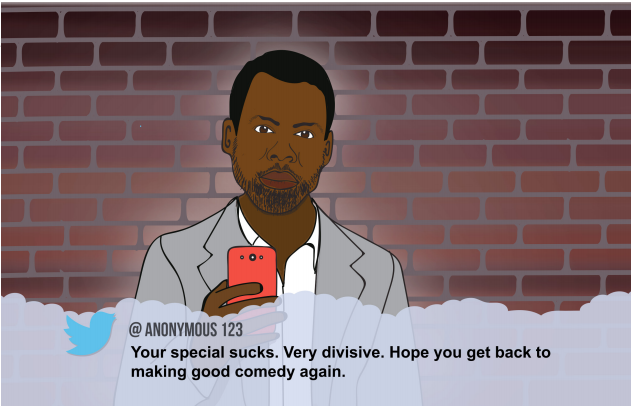Chris Rock, an American actor and comedian, sits reading mean Tweets people have made about him, a segment on Jimmy Kimmel Live. These Tweets are only a small part of the backlash comedians may face for saying controversial or problematic things in an increasingly “woke” society. Cartoon by Sunčana Pavlić
Stand-up comedians were once the leaders in a fight against censorship, but with the start of the 21st century, they stopped being funny.
From Don Rickels to Kevin Hart, stand-up comedy has caused more controversy than any almost other form of entertainment.
What started as a facet of Vaudeville theater and then evolved into its own artform with the creation of television and radio, was built on pushing the envelope and making the listener uncomfortable.
Comics such as Lenny Bruce, who was arrested in 1964 for using the word “c******cker” during a stand up, helped build the foundation for an artform that is and has always been designed to offend and push the idea of free speech to its limit. Stand up comedy has always fought against censorship in any form.
In fact, stand up comedians like George Carlin are the reason there is censorship on radio and television in the first place, after his sketch “The Seven Dirty Words” aired in 1973. It landed him in a Supreme Court case that decided the Federal Communications Commission could prohibit any broadcast they deemed obscene.
These comedians were followed by countless more who continued to offend, disgust, and agitate audiences, such as Richard Pryor. The release of his break- through album “That N*****’s Crazy” was almost stopped by his own label after the material was so controversial. Bill Hicks, who was often labeled “The Most Dangerous Comedian in the world” by media once called the American Dream a crock after his standup was removed from an episode of “The Tonight Show with Jay Leno,” following a joke about a handicapped classmate.
Despite the artforms being interwoven with controversy since its conception, stand up comedians are afraid to push the envelope in the way they once did. Before, attacks against stand up comedians’ material were isolated to antiquated forms of media, such as newspaper and radio, but with the creation of a 24 hour news cycle and the rapid growth of social media, comedians are afraid to make the same envelope-pushing jokes they once did.
Standup legends, such as Chris Rock, no longer perform at college campuses, which were previously a hotbed for controversial stand up, because he believes that they have grown too conservative. Jerry Seinfeld of “Seinfield”
fame has echoed a similar sentiment, saying that “the younger generation uses words like racist, sexist, and prejudice and have no idea what their talking about.”
Now, anytime a comedian offends someone, which is often, they can be attacked on platforms, such as Twitter, Facebook and Snapchat. This has led to the same comedians that once actively sought out new taboos to break, catering to their audience and trying their best not to offend anyone, which just isn’t funny.
Even though comedy is subjective, it is hard to dispute that modern stand- up comedy just feels bland and toothless to its predecessors. Comics must constantly find new buttons to push or it will grow complacent and boring as an artform. Now the comedians themselves are just as afraid to push buttons as their listeners, and their jokes just aren’t funny anymore.
